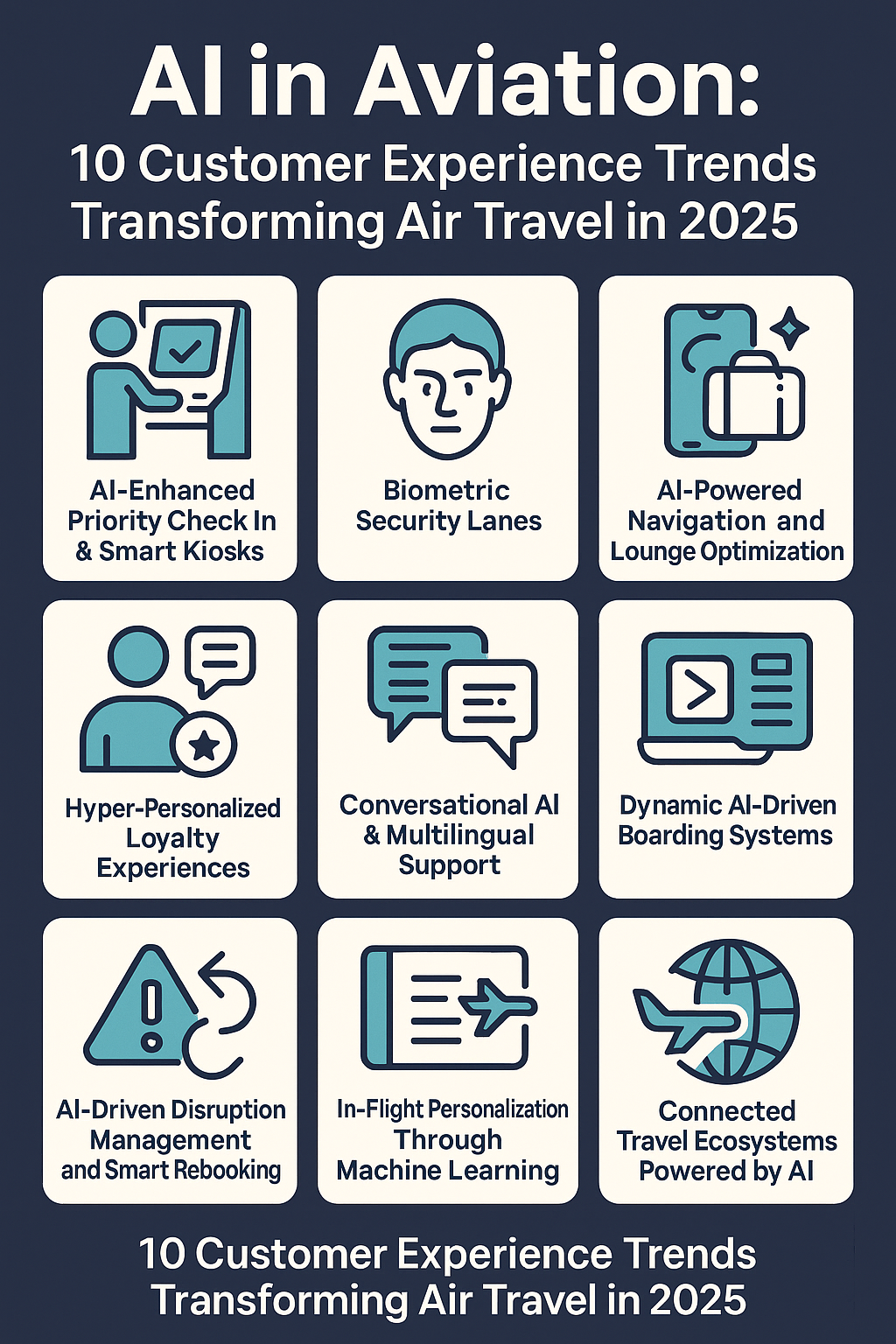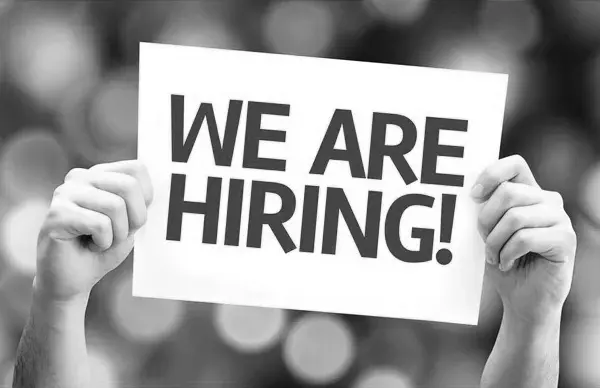The aviation industry is currently undergoing a significant transformation which affects passenger interactions during every stage of travel. The aviation industry increasingly uses AI in 2025 to deliver improved travel experiences through personalized services with rapid processing and user-friendly operations.
From the beginning to the end of air travel including all phases between airlines and airports leverage artificial intelligence to enhance flight safety and convenience and improve passenger satisfaction. The ability of AI to enhance passenger experience stands as a mandatory strategy for airlines who want to remain competitive in their industry.
Why Passenger Experience Matters in 2025
Passenger expectations have changed. The current travel population including regular flyers and business passengers together with premium-tier customers requires both high efficiency and complete journey personalization for their travel experience. The aviation industry must provide travel experiences with the same intelligence and responsiveness that customers experience through one-click purchases and AI recommendations.
The enhancement of CX (Customer Experience) delivers tangible business results that include loyal customers, improved NPS scores, reduced customer churn and better operational efficiency. Airlines and airports utilize AI to deliver real-time insights together with large-scale personalization and automated repetition management which enables better operations.
Let’s have a look at our top ten trends in Artificial Intelligence innovations to enhance passenger-focused aviation services:

1. AI-Enhanced Priority Check-In & Smart Kiosks
Premium airline passengers along with their frequent flyer counterparts no longer need to wait in lines at standard check-in counters. The latest version of kiosks uses AI technology to identify passengers through facial biometrics and access their travel details and provide customized check-in preferences.
AI kiosks at Singapore Changi Airport and London Heathrow airport adjust their user interfaces according to traveler profiles and booking details and language preferences. The speed and efficiency of check-in increase for regular travelers because of this technology which adds personalized touches to their experience.
2. Biometric Security Lanes for Seamless Access
Security has traditionally been a major bottleneck in the airport experience. AI converts this security headache into a competitive benefit through biometric-first identity checks that operate without human contact.
The security lanes at airports in Atlanta, Dubai and Amsterdam use facial recognition technology to process travellers in under three seconds without requiring their passport or boarding pass. Deep learning enables these systems to adapt to facial feature variations and lighting conditions thus enhancing their reliability for frequent flyers.
3. Real-Time Baggage Tracking & Smart Handling
Lost luggage creates extensive travel disruptions especially among passengers who need to make tight connections particularly when they travel in premium class. The combination of RFID tags and IoT sensors with machine learning enables automatic baggage tracking throughout all transportation segments.
The airline industry has adopted AI to power their mobile applications which now provide predictive delivery time estimates as well as baggage routing anomaly detection and delivery status updates to passengers before landing. Active disclosure of information strengthens passenger trust while sustaining high satisfaction levels.
4. AI-Powered Navigation and Lounge Optimization
Travelers experience high stress when attempting to navigate large terminals especially when they have limited time between flights. Modern navigation applications utilize real-time airport data combined with crowd intelligence to direct users toward the fastest routes.
Premium airline passengers gain benefits from AI-controlled lounge management platforms that modify environmental factors including lighting and music and food availability while optimizing lounge occupancy. Certain business-class lounges employ AI technology to notify passengers about boarding time so they can avoid waiting unnecessarily or rushing at the last minute.
5. Hyper-Personalized Loyalty Experiences
The application of artificial intelligence by airlines has established new standards of individualized service for their loyalty programs. AI engines analyze flight histories and purchase behaviors alongside social media signals to create customized loyalty experiences including bonus miles and upgrade offers and personalized airport benefits.
Emirates Skywards and United Airlines MileagePlus utilize AI to proactively suggest route changes and upgrade options for their members before they initiate their booking process.
6. Conversational AI & Multilingual Support
Virtual travel assistants like Air France’s Louis or Lufthansa’s Mildred now engage in smarter and more responsive multilingual dialogue. These bots utilize NLP (Natural Language Processing) to maintain fluid conversations and understand context and provide immediate assistance for gate changes and dietary requests.
Travelers who speak different languages can navigate foreign airports easily because of multilingual AI support that includes languages with smaller speaker populations.
7. Dynamic AI-Driven Boarding Systems
Traditional boarding procedures frequently lead to avoidable stress and airport congestion. Airlines utilize AI to establish data-based smarter boarding procedures. The system generates optimized boarding groups by analyzing seating arrangements with passenger mobility and loyalty status and the quantity of carry-on items.
Major airports including Munich and Tokyo Haneda have adopted this trend which reduced boarding time by 30% while providing premium boarding options to frequent flyers.
8. In-Flight Personalization Through Machine Learning
After boarding flights passengers receive more personalized attention rather than being treated as mere seat numbers. Modern aircraft equipped with AI systems maintain user-specific data about preferred seat positions and chosen meals along with entertainment preferences.
AI recommends productivity tools to business travelers and local activity suggestions based on destination and personal interests to leisure travelers. Emirates, Qatar Airways, and Singapore Airlines lead the development of this technology which they test in their first and business class sections.
9. AI-Driven Disruption Management and Smart Rebooking
Travel disruptions happen inevitably but the quality of their management creates the real difference. AI systems can predict flight delays ahead of time and predict flight disruptions while providing automated flight rebooking options to alternative flights.
Travelers who frequently fly and hold elite-tier status get preferential treatment for flight upgrades and re-routing while receiving their notifications through mobile apps and text messages. AI systems now provide passengers with alternative flight routes that perform better and instant compensation vouchers to eliminate manual claims and customer complaints.
10. Connected Travel Ecosystems Powered by AI
The most futuristic trend? Airlines together with airports establish complete AI ecosystems that link all points of travel. The platform enables travelers to purchase flights and view airport traffic updates along with personalized terminal guidance and pre-approved shopping deals and real-time predictive alerts.
AI has reached its highest point in aviation digital transformation by providing an intelligent travel experience that builds loyalty and attracts high-value travelers to return.
Case Studies: AI-Driven Passenger Experiences in Action
The implementation of biometric fast lanes by Heathrow Airport allows frequent flyers to cut their average wait duration by 40%.
Delta Air Lines dedicates substantial funds to AI development for enhancing PARALLEL REALITY displays that display distinct flight information and gate status to various passengers observing the same screen.
Singapore Airlines uses artificial intelligence to provide KrisFlyer members with personalized recommendations for dining and spa services at their destination.
The presented concepts are currently active and produce measurable outcomes.
Conclusion: Putting Passengers Front & Center with AI in Aviation
AI exists beyond technological demonstrations and remote theoretical concepts. Air travel excellence for passengers becomes its main focus. The future of the aviation travel experience will be defined by AI.
Decision-makers who lead the digital transformation in Aviation must understand that AI is a powerful strategic instrument to deliver exceptional customer experiences and increase passenger throughput.
✈️ Ready to Take Off with AI?
We develop AI and application solutions for aviation, telecom, legal and healthcare sectors. Airline and airport operators who want to enhance the traveller experience through their operations should contact us.
Our AI solutions can assist your aviation digital transformation. Get in touch and discuss implementation possibilities.


